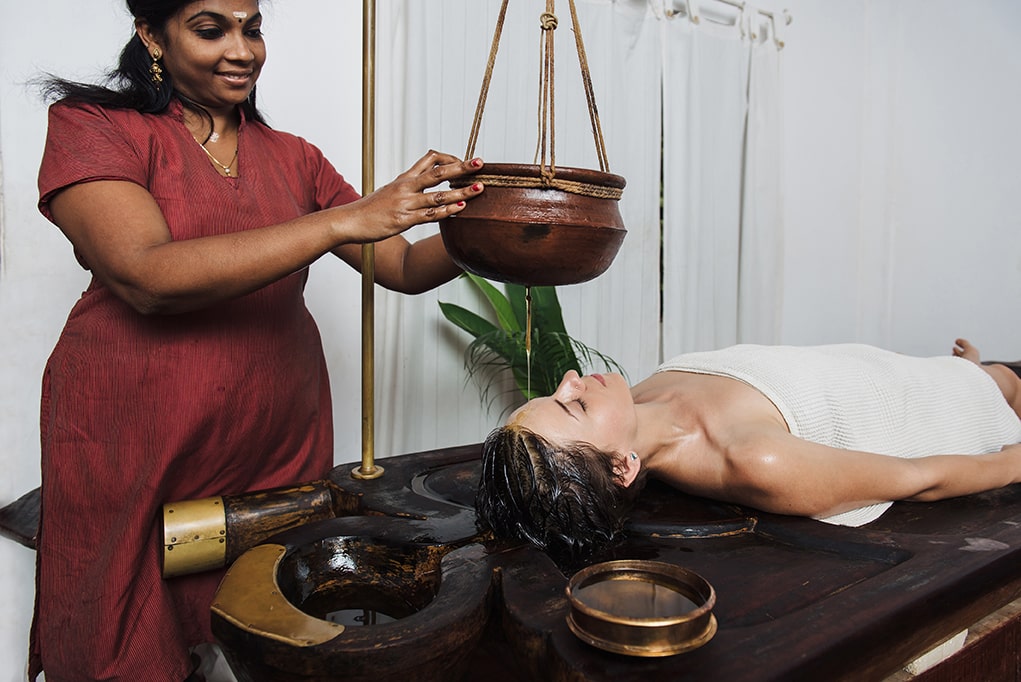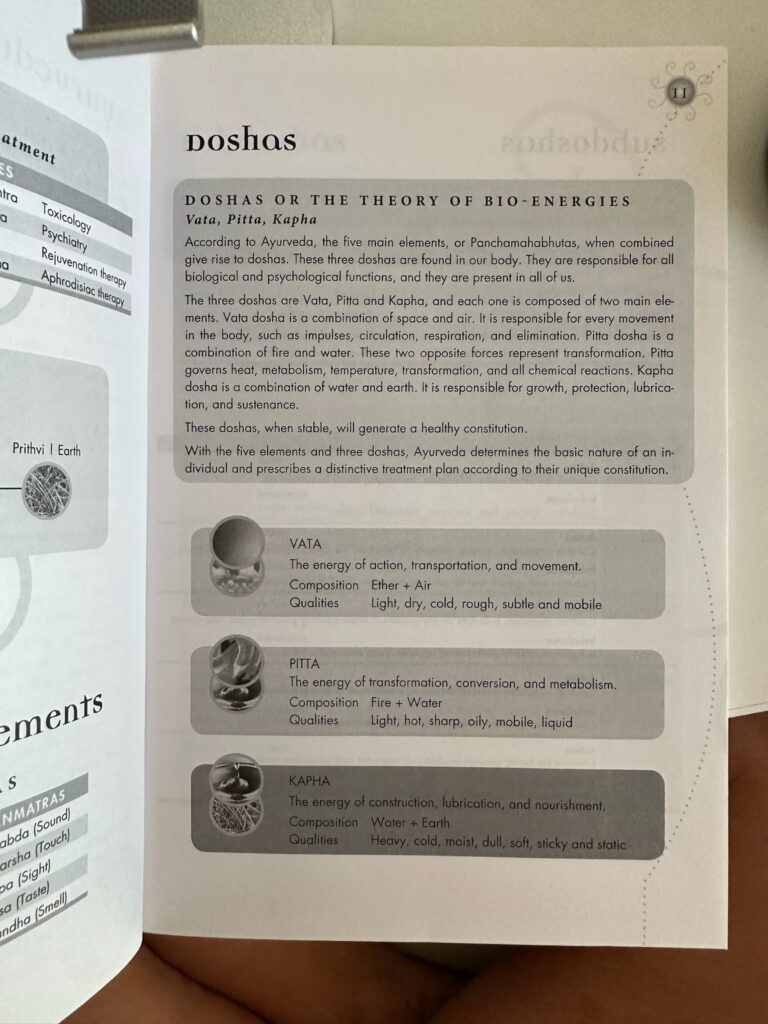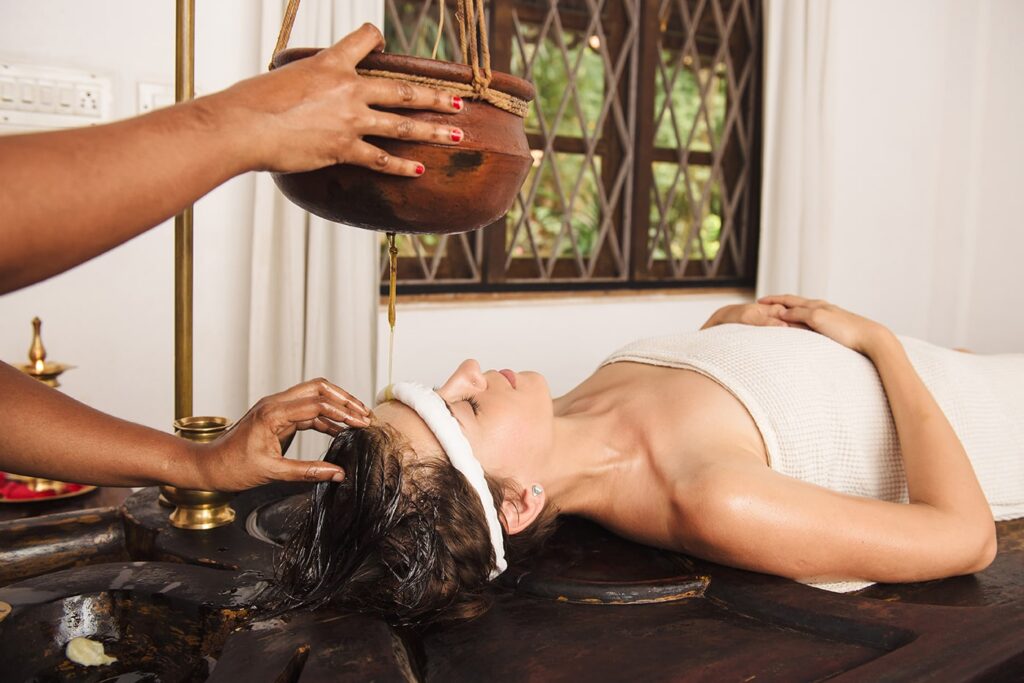Ayurveda is a healing practice rooted in ancient wisdom, a system of medicine that has been around for thousands of years. Originating from India, this powerful and holistic approach towards health and well-being has significantly influenced my life and well-being.
I was introduced to Ayurveda a long time ago and have been consistently amazed by its effectiveness. While I often incorporate various other practices, such as biohacking and alternative medicine into my health routine, I find myself returning to Ayurveda during my most critical healing phases.
What draws me back is Ayurveda’s unique approach to health: it focuses not only on the physical body but also the human body’s mental, emotional, and spiritual aspects. This makes it a comprehensive and integrative medicine.

What is Ayurveda?
Ayurveda is a system of medicine that originated in India more than 3,000 years ago[1][2]. The term Ayurveda is derived from the Sanskrit words ayur (life) and veda (science or knowledge), which translates to knowledge of life[1]. Ayurveda is based on the idea that disease is due to an imbalance or stress in a person’s consciousness, and it encourages certain lifestyle interventions and natural therapies to regain a balance between the body, mind, spirit, and the environment[1]. Ayurveda is considered a form of complementary and alternative medicine (CAM) in the United States[3].In India, Ayurveda is considered a form of medical care, equal to conventional Western medicine, traditional Chinese medicine, naturopathic medicine, and homeopathic medicine[1][4].
The Wisdom of Ancient Science
Ayurveda, in Sanskrit, translates to ‘the science of life.’ This ancient science, with its holistic approach, focuses on creating harmony between the body, mind, and spirit. Unlike conventional medicine, which often focuses on treating symptoms, Ayurveda’s goal is to address the root cause of disease and promote good health.

The Doshas: Vata, Pitta, Kapha
Ayurveda’s fundamental principles revolve around three bioenergies or doshas—Vata, Pitta, and Kapha. These are based on the five elements—earth, air, fire, water, and space— and how they combine in the human body. Knowing your predominant body type helps you design a healthy lifestyle and live a happy and balanced life[5][6]. Each dosha has specific dietary recommendations, physical activities, and even environmental preferences that help maintain balance and good health.
I am a Vata-Pitta type, indicating a predominance of air and ether (Vata) and fire and water (Pitta) in my physiology. As a Vata-Pitta, I have a dual dosha, which means I need to maintain a balance between these two energies. When there’s too much ‘fire’ (Pitta), I must introduce elements to cool down, whether it’s through diet, lifestyle, or other Ayurvedic treatments. Similarly, if there’s too much ‘air’ (Vata), I’m guided to consume foods that are moisturizing and nurturing as well as other grounding practices. This understanding has been instrumental in helping me stay balanced and healthy and has also served as a form of ‘biohacking’ where I optimize my health based on my unique dosha.
What’s remarkable about Ayurveda is how it has distilled human physiology into a few fundamental types. This might remind you of the psychological understanding that there are only a handful of personality types. Ayurvedic practitioners, through their comprehensive Ayurvedic training, can identify your body type by checking your pulse, examining your eyes, and asking about your lifestyle and diet. They then use this information to recommend treatments, dietary adjustments, and lifestyle modifications specific to you.

Vata: The Energy of Movement
Vata, derived from the Sanskrit word meaning ‘wind’, is associated with the elements of air and space. It is the force behind all biological activities and movements, responsible for functions related to circulation, breathing, nerve impulses, and movement in the muscles and tissues. Physiologically, people with a Vata constitution tend to be lean, fast-moving, and energetic. However, when out of balance, Vata can lead to physical and mental conditions such as anxiety, insomnia, dry skin, constipation, and difficulty focusing.

Pitta: The Energy of Digestion and Metabolism
Pitta, connected to the elements of fire and water, is associated with metabolic activities in the body, including digestion, absorption, nutrition, and body temperature regulation. Individuals with a predominance of the Pitta dosha often have a fiery nature that manifests in both body and mind. They are typically intelligent, hard-working, and competitive but can become irritable and aggressive when Pitta is out of balance. Physically, Pitta imbalances can result in inflammation, infections, ulcers, and skin rashes.

Kapha: The Energy of Structure and Lubrication
Kapha, linked to earth and water, gives the body its physical form, structure, and the smooth functioning of bodily systems. It is responsible for growth, adding bulk to body tissues, and providing stability. Individuals with a Kapha constitution are typically strong, calm, and resilient. However, when Kapha is out of balance, it can lead to weight gain, congestion, lethargy, and resistance to change.

Dosha Combinations: Vata-Pitta and Others
It’s important to note that most individuals, like myself, have a combination of two doshas, with one being more dominant. As a Vata-Pitta type, you might find yourself dynamic and lively, possessing quick intellect and a strong ability to understand and assimilate new information. However, the combination can also lead to over-exertion and burnout if not carefully managed.
In another instance, a Pitta-Kapha person will have the strength and stability of Kapha, paired with the fiery dynamism of Pitta, potentially making them ambitious and grounded individuals. A Kapha-Vata person, on the other hand, might be calm and stable but also possess the active, energetic nature of Vata.

Ayurveda and Modern Medicine
Ayurveda, the term derived from Sanskrit words ‘Ayur’ meaning life and ‘Veda’ meaning knowledge, represents an ancient medicine system originating from the Indian subcontinent. Systematic research reviews suggest that this holistic health practice, boasting a history of several thousand years, remains relevant and effective today. Commonly prescribed as part of ayurvedic treatment, herbal formulas, specialized diets, and other unique health practices like breathing exercises cater to the individual’s unique constitution or doshas. Furthermore, studies suggest that regular practice of Ayurveda can play a crucial role in maintaining mental health by reducing stress, anxiety, and enhancing overall well-being.
Modern medicine often categorizes individuals based on their metabolic body type. Interestingly, this approach has its roots in Ayurveda. Unlike conventional western medicine, Ayurveda doesn’t advocate a one-size-fits-all approach. Instead, it emphasizes the uniqueness of each individual, necessitating personalized health regimens.
Functional doctors and Ayurvedic practitioners can determine your body type by assessing various physical traits, examining the eyes and tongue, and feeling the pulse. I’ve had the privilege of working with an exceptional Ayurvedic functional medicine doctor who guided me on this fascinating journey of self-discovery and healing.

Ayurveda and Pregnancy
One of the most remarkable experiences of my life was during my pregnancy. I sought help from a renowned Ayurvedic functional medicine doctor based in Beverly Hills. His expertise in both conventional western medicine and traditional Indian medicine made him an invaluable guide during this phase of my life.
Every three to four weeks, he would recommend specific foods and herbal medicines as per my body type and the stage of my pregnancy. For instance, when my baby’s eyes and brain were developing, he suggested certain foods known to nourish these tissues. This strategic approach of ‘feeding the fetus’ with specific nutrients at different developmental stages was fascinating. It was as if we were supporting the baby’s growth and development in the most organic, natural way possible.
In addition to dietary guidance, the doctor also performed oil massages to keep my body moisturized and supple. These massages, coupled with specific dietary guidelines, ensured a smooth pregnancy and a healthy baby.

Ayurveda: An Experience of Healing
This treatment like others I talk about is not a quick fix; it’s a carefully designed, hours-long process aimed at healing my body from the inside out. It begins with Yoni steaming, a practice that involves sitting over a pot of herbal-infused steam. This therapy moisturizes from within, using the body’s natural pathways to introduce healing herbs.
After the steam, my healer moves onto the Ayurvedic massage therapy. She gently applies medicinal oils all over my body while I lay on the table, enveloped in warmth and aromatic herbal scents. The treatment even includes the application of oil to my eyes, enhancing moisture and rejuvenating the senses.
The final part of the session involved Shirodhara, an ancient Ayurvedic practice where warm oil is dripped onto the forehead, targeting the third eye chakra. This practice is said to stimulate the pituitary gland, or “master gland,” promoting overall well-being and balance.

My History with Ayurveda
I was born in Tajikistan, where I was first introduced to Ayurveda. Since then, Ayurveda has been a recurring theme in my life, guiding me through periods of health challenges and helping me maintain optimal wellness. I’ve always felt a closer connection to Ayurvedic medicine than Chinese medicine, perhaps because of its comprehensive and individualistic approach.
While I’ve experienced the benefits of various health modalities, including pharmaceutical drugs and other forms of complementary and alternative medicine, I find myself consistently returning to Ayurveda. This ancient science has saved me countless times, proving its efficacy and relevance even in today’s modern world.

Ayurveda: A Part of My Biohacking Journey
Throughout my journey of self-exploration and biohacking, I’ve learned the importance of recognizing and honoring my body’s unique needs. Ayurveda, with its focus on individual body types and personalized treatments, fits perfectly into my holistic approach towards health.
Despite my explorations into various health practices, I often find myself returning to Ayurveda’s wisdom, especially when I encounter health challenges that seem beyond my control. I’ve found that the “best biohack” is not necessarily a high-tech gadget or the latest diet trend; it’s Ayurveda. From combating the effects of frequent travel to managing pregnancy health, Ayurveda has been my go-to resource.
More than just a system of healthcare, Ayurveda has taught me to listen to my body and respond to its needs with compassion and understanding. Rather than treating symptoms, Ayurveda has taught me to address the root causes of any health issues, contributing to long-term health and wellness. See my Instagram post!

Ayurveda Teachings
Today, in our fast-paced world, filled with technological advancements and cutting-edge research, Ayurveda’s ancient wisdom holds a unique place. Alongside the latest scientific breakthroughs, it provides a holistic perspective on health, reminding us of our innate connection with nature and our bodies. It’s not just about using peptides or doing stem cell therapies, but also about balancing ourselves with traditional medicine and honoring our unique physiological needs.
To me, Ayurveda isn’t merely a healthcare system; it’s a lifestyle, a holistic approach towards life and health. With its foundations rooted in nature’s wisdom and personalized care, Ayurveda not only offers remedies for ailments but also guides one towards a more balanced, harmonious life. It has been an integral part of my life journey and will continue to guide me towards optimal health and wellness.
Deepak Chopra, a pioneer in integrative medicine and personal transformation, is a notable advocate for Ayurveda. His teachings are rooted in this ancient science, emphasizing the importance of balance in achieving health and well-being.

Ayurveda's Global Influence
It’s not just in India or Russia where Ayurveda has a significant presence. From the Ayurvedic Institute in New Mexico to numerous practitioners around the world, Ayurveda’s reach is truly global. Its universal principles, holistic approach, and natural therapies have been recognized by people from all walks of life.
In the heart of Los Angeles, I had the privilege of meeting an exceptional Ayurvedic practitioner from India. Her profound knowledge and intuitive understanding of Ayurveda have been vital in my healing journey. She introduced me to various Ayurvedic products and herbal remedies that have since become staples in my health regimen.
Herbal Remedies in Ayurveda
One of the hallmarks of Ayurveda is its use of herbal remedies. Many herbs have been recognized by Ayurveda for their medicinal properties. From boosting the immune system and promoting muscle growth to managing cholesterol levels, these herbs have a wide range of benefits.
However, the use of herbs in Ayurveda is not one-size-fits-all. Just as diet and lifestyle are tailored to individual body types, the use of herbs is also personalized. What might work for one person might not work for another. This personalized approach is one of the reasons why Ayurveda has been so effective for thousands of years.

Embracing Ayurveda: A Personalized Approach to Healthcare
Ayurveda, the science of life, encompasses a broad and comprehensive approach to healthcare, including physical, mental, and spiritual aspects. Practicing Ayurveda involves a commitment to personalization, taking into account each individual’s unique life forces or doshas as determined by their constitution. Ayurvedic treatments range from customized diets to medical oils and personalized Ayurvedic preparations, emphasizing herbal medicine. Each treatment modality is steeped in ancient wisdom, tracing its roots back to traditional Ayurvedic medicine. Despite its ancient origins, modern science continually reaffirms the benefits of Ayurveda.
Systematic research reviews highlight its potential role as a viable complementary medicine, capable of assisting in the management of several health conditions, such as rheumatoid arthritis and Crohn’s disease. By focusing on holistic and tailored healthcare, Ayurveda allows for a proactive and effective disease management approach.
Lead Poisoning and Ayurvedic Treatment: A Word of Caution
While Ayurveda’s benefits are numerous, it is vital to be aware of certain risks. Some cases of lead poisoning have been associated with the consumption of certain Ayurvedic preparations, particularly those containing heavy metals like lead and mercury. This calls for the sourcing of Ayurvedic preparations from trusted, reputable providers, and for patients to engage with knowledgeable healthcare providers to guide them through their Ayurvedic journey. These concerns echo findings from systematic research reviews and well-designed clinical trials, featured in various international journals. Among these, The International Journal of Ayurveda and Complementary Medicine and The EPMA Journal have published articles advocating for safety and efficacy in the use of Ayurvedic herbs and preparations.

Coaching Sessions
I am currently offering one-on-one coaching sessions to help individuals who may be facing challenges in achieving their goals independently. My goal as a coach is to guide and support you in every step of your journey, while also holding you accountable for the actions you take towards achieving your desired outcomes.
Whether you want to improve your health and wellness, establish better habits, or achieve personal and professional growth, I can provide you with personalized attention, a customized approach that suits your unique needs, and the necessary tools and motivation to help you reach your full potential and transform your life.

Conclusion
As I continue my journey with Ayurveda, I’m constantly learning more about myself. I understand that Ayurveda is more than just a practice I follow; it’s a way of life. Whether it’s understanding my body type or learning to nourish myself in line with my dosha, the ancient wisdom of Ayurveda has provided me with invaluable insights.
In essence, Ayurveda has enabled me to connect with myself on a profound level, embracing a holistic approach to wellness that encompasses physical, mental, and spiritual health. While embracing the benefits of this traditional medicine, it’s also crucial to be cognizant of potential risks, such as the potential presence of heavy metals in some Ayurvedic preparations. It underscores the need to consult with knowledgeable practitioners and source products from reputable suppliers.
As scientific research continues to unravel the mysteries of this ancient medicinal system, the prospects of Ayurveda’s role in contemporary healthcare seem promising. Yet, it is the personal journey each of us undertakes with Ayurveda that truly defines its value. It is more than just a healthcare system – it’s a path towards self-discovery, balance, and a harmonious life. As I navigate this path, I look forward to uncovering more of the wisdom Ayurveda has to offer and how I can apply it to continue enhancing my well-being.
FAQ
Ayurveda is an ancient medicine system originating from India. The term Ayurveda comes from Sanskrit words 'Ayur' meaning life and 'Veda' meaning knowledge, hence it's often referred to as 'knowledge of life'.
Ayurveda's fundamental principles revolve around three doshas—Vata, Pitta, and Kapha, which are combinations of the five elements—earth, air, fire, water, and space.
Doshas are the life forces or bioenergies that Ayurveda identifies as essential components of health. The three doshas are Vata, Pitta, and Kapha.
Ayurveda considers mental health to be equally important as physical health. It prescribes a holistic approach involving dietary modifications, herbal medicines, meditation, and breathing exercises to maintain mental well-being.
Practicing Ayurveda involves understanding your unique dosha type, adhering to dietary and lifestyle recommendations corresponding to that type, and possibly utilizing herbal remedies and Ayurvedic treatments under the guidance of a knowledgeable practitioner.
Some Ayurvedic treatments, especially herbal preparations, have been associated with lead poisoning due to the presence of heavy metals. It's essential to purchase Ayurvedic medicines from reputable sources and consult a healthcare provider.
Ayurvedic treatments vary based on an individual's dosha and specific health conditions. Commonly prescribed treatments might include herbal medicines, diet modifications, massage with medicinal oils, and breathing exercises.
Ayurveda places a high emphasis on diet as it believes that different types of food can balance or disrupt the doshas. Therefore, understanding your dosha can help determine which foods are most beneficial for your health.
An Ayurvedic diet is personalized to an individual's dosha. However, in general, it encourages whole or minimally processed foods and discourages foods high in processed sugars and fats.
Yes, Ayurveda can be used as a complementary approach alongside conventional medicine.

Resources

With a positive approach and a motivation mindset, you will reach your health goals, no matter how hard they may seem at first. Learn more about my one-on-one coaching program here.







